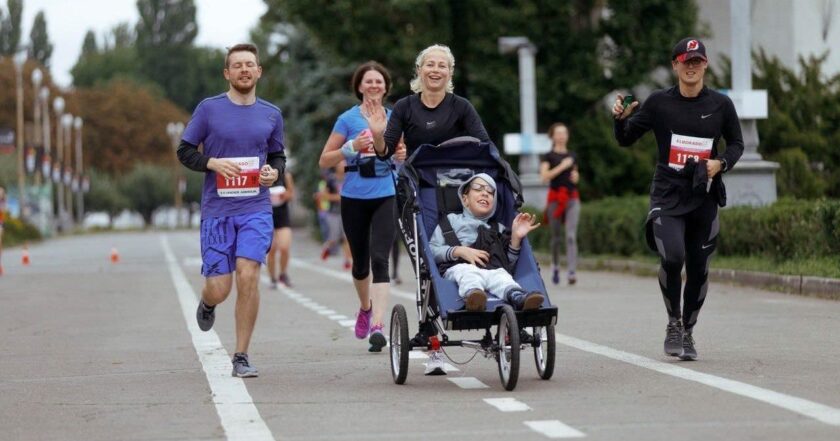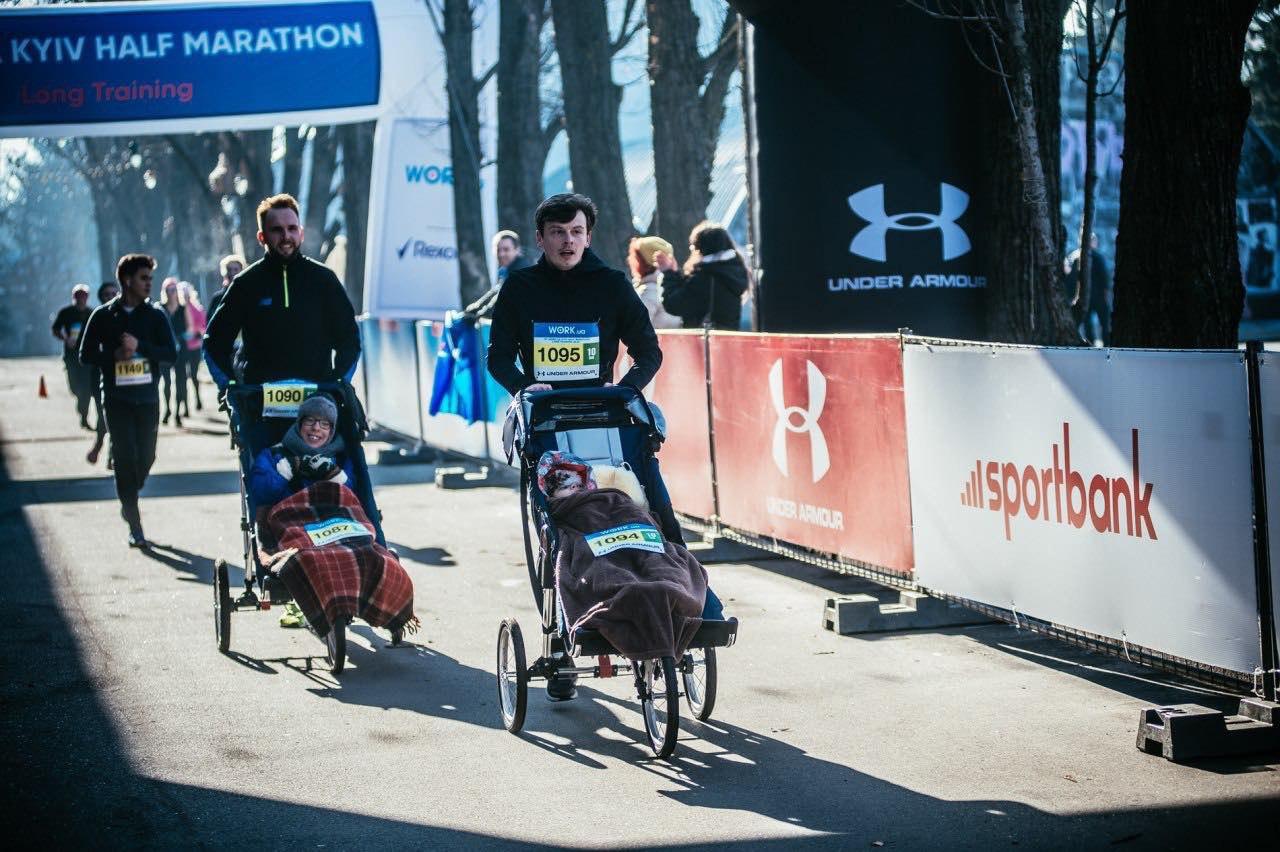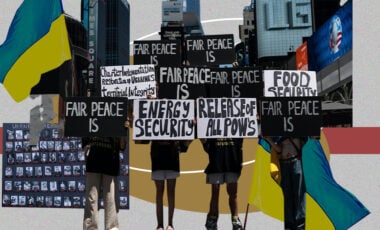"They can't run on their own, but they feel important": how children with cerebral palsy socialize through running

Hand In Hand is a unique club where children with cerebral palsy can train with their parents and volunteers, participate in races, and have their first victories. For instance, 12-year-old marathon participant Fedir Tekliuk entered the Register of Records of Ukraine as the first child diagnosed with cerebral palsy who ran a distance of 21 km at the Wizz Air Kyiv City Marathon accompanied by coach Maryna Saienko.
"Children with cerebral palsy need socialization because they're closed off from communication"
Fedir's mother, Svitlana Tekliuk says that she can't describe her emotions after the marathon in which her son participated—it is a feeling of victory and overcoming and the moment when the child receives a medal and a result for their work.
"Unfortunately, our children were born with the diagnosis, and they need constant physical activity. The Hand in Hand project is essential socially because people gather around my child and give him social significance: he can't run on his own, but people constantly surround him, and he feels that he's needed, and important, and that he can encourage others. During the run, Fedia handled the entire group, even though he was sitting in a wheelchair. He constantly asked: Is Katia there? Is Kyrylo running? No one is behind?" Svitlana recalls.
Fedir says his mother, Svitlana, is very sociable and loves communication. He likes the feeling of the team, he values everyone, and knows all the team members. During the quarantine, he misses the running club and looks forward to resuming training.
"Such children are different, and due to their attributes, they are locked up at home. We have one or two schools in Ukraine where children with disabilities can attend. They are immediately locked up at home, and we, the parents, too. If it weren't for our persistence, we would not get into the boarding school where such children want to study. He is there with a nanny, and she helps him, although he cannot write. This club is a continuation of socialization, one of the opportunities to communicate with other children: not in the family and not in a closed house. They need socialization like no one else because they are closed off from communication in the family," says Svitlana.
Fedir doesn't see himself as disabled because his parents try to erase the fact that he's not like everyone else.
"We go everywhere with him, show him everything, and push the idea for him to feel like everyone else. We feel the lack of everything essential for his life. Our infrastructure is terrible. The child weighs 37 kg now, and the lightest stroller I can find on the territory of Ukraine is 14 kg. The rest are 28 or 36 kg, and at the same time, any curb becomes a difficult obstacle: going down, climbing, and going to the crossing becomes difficult. These children have the right to life and everything we do and feel. Yes, it might not be nice to see them drooling in a cafe, but they are human beings like the rest of us. These children need 24/7 care and ongoing rehabilitation. They need physical activity: when they do it indoors or at home, it's one thing, and when they go to the stadium, it's completely different," says Fedir's mother.
I advise you to take your sneakers and child and go to stadium
Edith Agbongale had a cardiac arrest and suffered a motor system injury in one month. Her mother, Louise, notes that the child undergoes rehabilitation all her life, and it is a complex where physics and pain are present one can't go without. Any recovery is hard work, tears, and protests of the child, even though there are people and children. The Hand In Hand running club is a project of a different format. Training takes place at the Olimpiiskyi stadium, where the energy is already another thing, says Louise.
"Parents with children come in the evening, and the children know that no one will hurt them. The club has comfortable, special strollers that do not hurt the children. The children know that it is a noisy company of young people who are always positive. The children's coaches and volunteers are perceived at these training as their friends, contributing to socialization. It is also a plus for the mother because she can train with the child anytime. For example, in rehabilitation, mothers hold the child or sit in the corridor if the session with the trainer takes place without the mothers. We can join the company and run at the same level as the child," says Edith's mother.
Louise used to play sports and run, but now she doesn't have time for it, and her conscience doesn't allow her to leave her child with her mother just to run. Now Louise gives Edith to the athletes, and they run with her. At this time, Louise herself has time for sports.
"The peculiarity of this project is that parents and children are on the same level. A huge plus is that participation in it is free because we are used to paying for everything ourselves. The state allocates quite good money for rehabilitation—25 thousand hryvnias—but it is enough for ten days of rehabilitation. We rehabilitate continuously and spend about 60-70 thousand per month on this. The state's amount is large but not enough," says Louise.
Training organizers charge everyone with positive energy, and children and parents immediately switch to the youthful approach and jokes. The first two months were difficult for Louisa and Edith because they had not yet taken the distances already available to other children. Although each child has its characteristics, like twitching and swallowing, the athletes running with children ask about the qualities and know about them during the run.
"I advise parents to buy sports clothes, take their child and go to the Hand in Hand club because two days a week you will communicate with like-minded people, be on a positive vibe. These are not the parents who give up on everything, but those, who try to give their children a full life, and positive emotions. Children squeal with pleasure when they run with them. The second point is therapy for parents because when you communicate with someone just like you, relief and understanding come," Louise concludes.
It started with half marathon and grew into running club: history
Maksym Mykhalkov, one of the organizers of the Hand In Hand running club, said that at first, the athlete Maryna Saienko had the idea to run a marathon with Fedir last July 2019. They have been preparing for the race since the summer of last year, the race itself took place on October 6, and everyone was invited to the training. Later, the idea of creating a whole running club arose, which now has seven families with children with cerebral palsy and 40 people who just come and train with them.
At the end of October, the Hand In Hand public organization was registered, which now helps children with cerebral palsy to run. Training is held at Olympiiskyi Stadium, resulting from a partnership agreement with sponsors. All training is free and takes place on Tuesdays and Thursdays. On Saturdays, we have long races on Trukhaniv Island or the Expocenter of Ukraine in open locations. We already have four strollers children can use to train three times a week and participate in marathons.
Currently, the Hand In Hand club has two areas of work: the search for jogging strollers and the training organization.
"The goal of our club is, first, socialization through running. Our task is to communicate with children with cerebral palsy and expand their circle of acquaintances and friends. They come to training, joke, have fun, and find new people. It is very different from their usual way of life. We concentrate on this and try to support it. It is human nature to bypass and ignore the negative, but our experience shows that many caring people worldwide are ready to invest their time, emotions, and energy. For such children, it is important because they are being isolated. Our goal is to allow them to be full members of society," says Maksym Mykhalkov.
























































